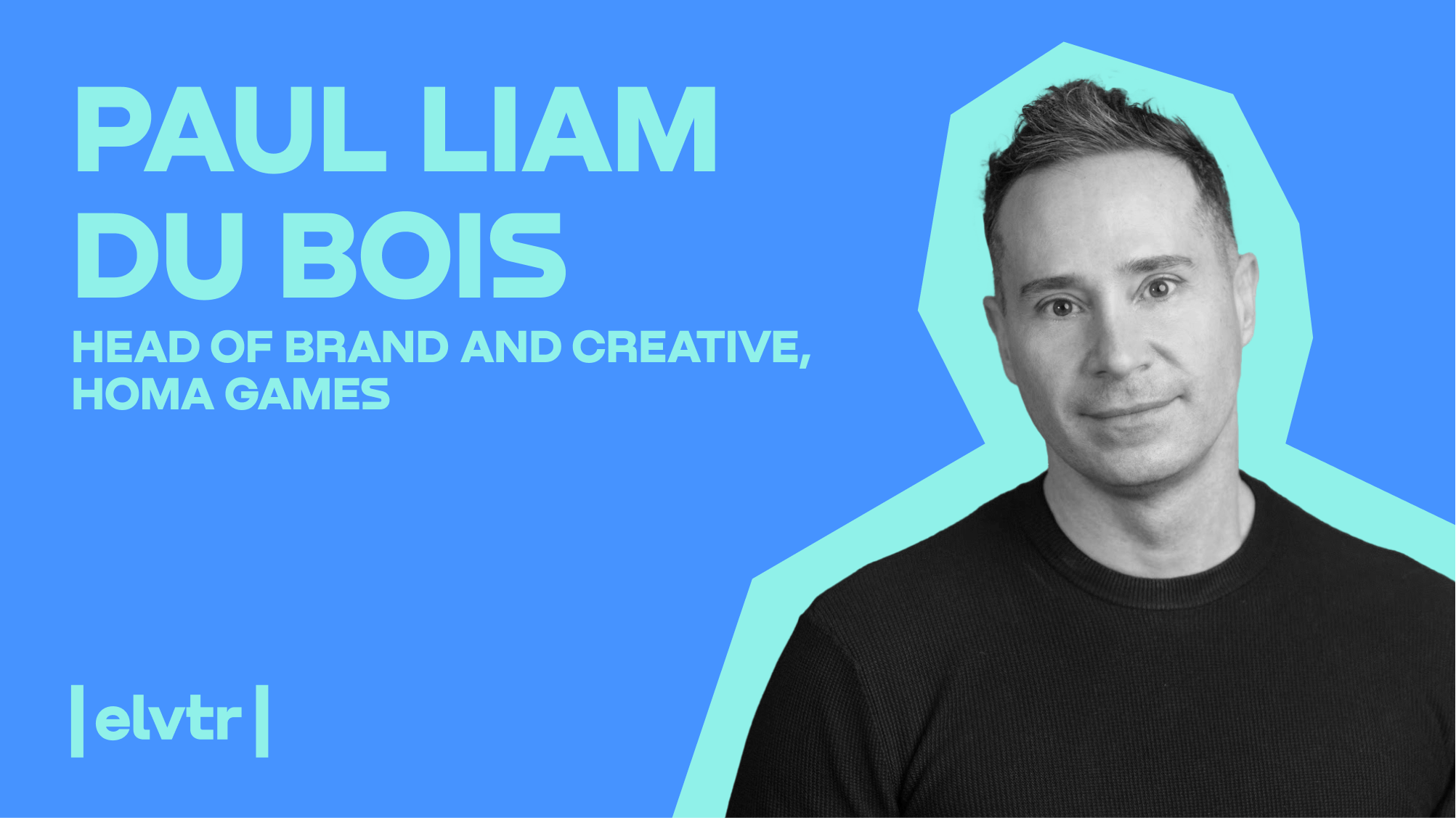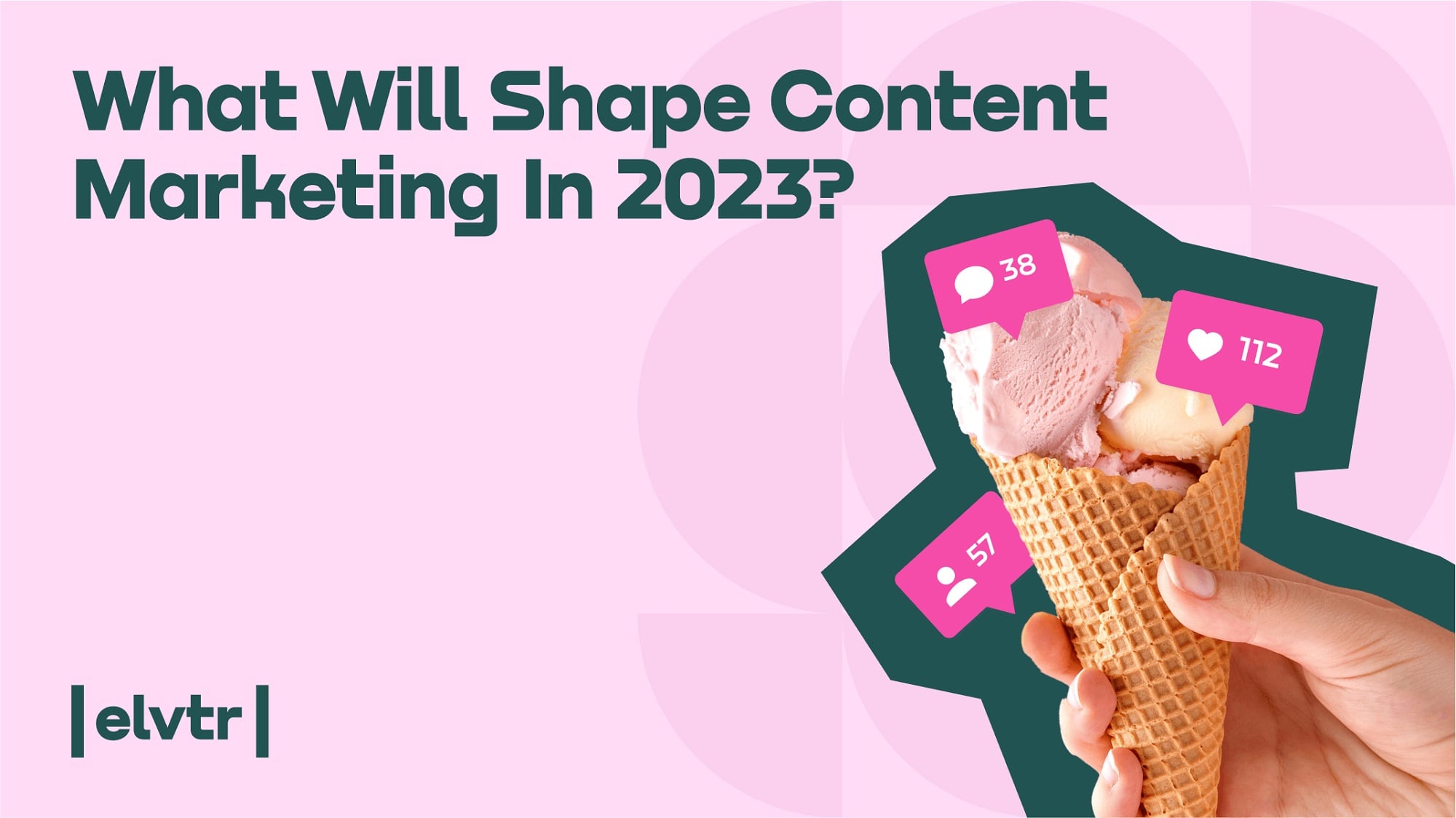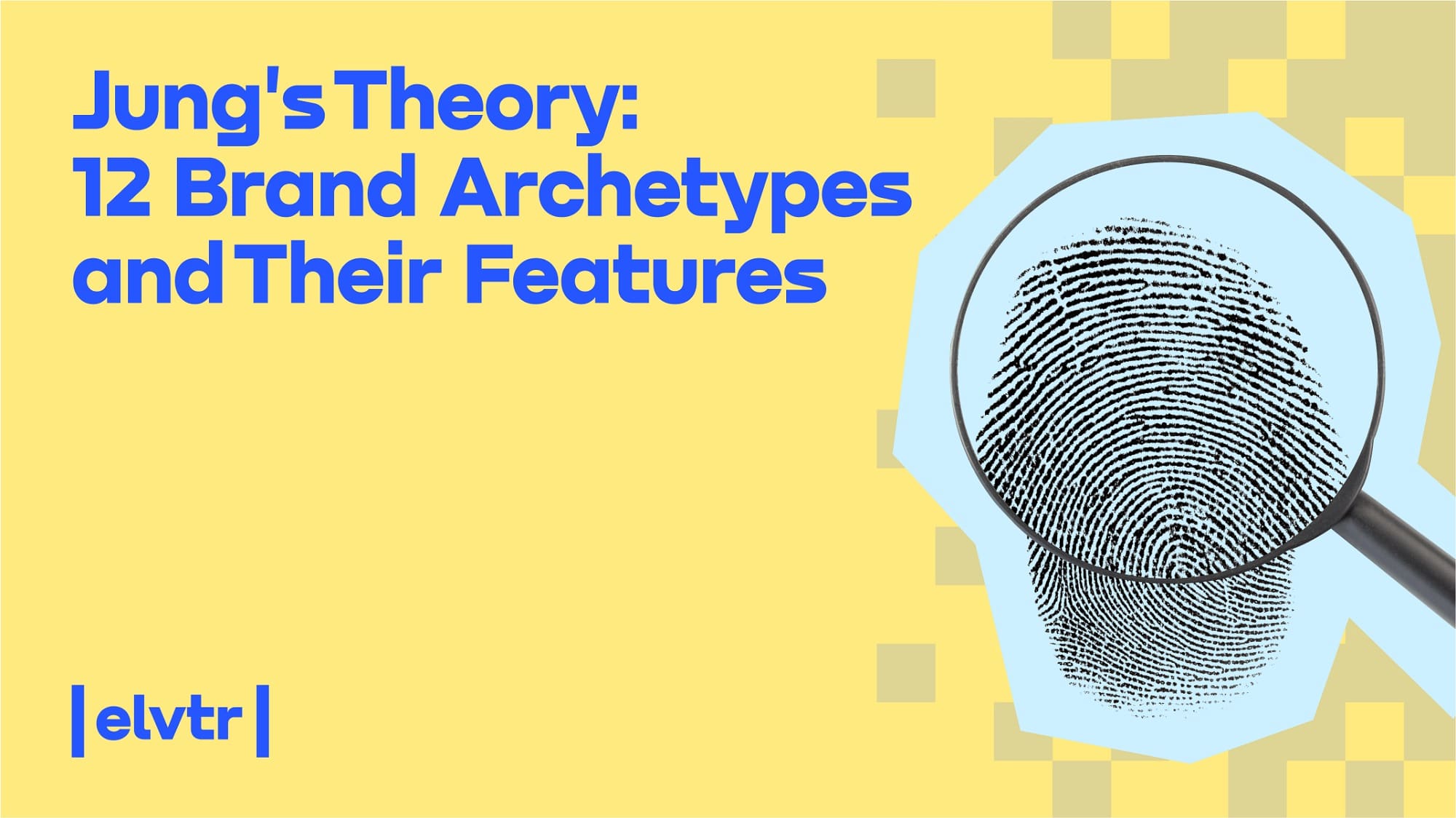- MAIN PAGE
- – elvtr magazine – WHAT WILL SHAPE BRAND-CONSUMER RELATIONSHIPS IN 2023
WHAT WILL SHAPE BRAND-CONSUMER RELATIONSHIPS IN 2023

From conceiving and managing a global space tourism event to MTV’s Top 10 and even a global ‘art battle’, there is hardly a project that Paul Liam Du Bois hasn’t made shine with his ingenious touch.
With nearly two decades as brand & creative director under his belt, Du Bois has crafted and executed successful branding strategies for some of the world’s most iconic brands: MTV, Nickelodeon, Sony, Coca-Cola, Google, and Vogue.
Du Bois sat for a chat with ELVTR on TikTok, Elon Musk, his favourite brands, and what big firms can learn from smaller ones. There is an emerging ‘glocal’ culture of commonly shared values, he argues, that is changing everything corporations know about branding.
What cultural changes will be shaping branding strategies in the future?
AI is a gigantic cultural influencer. It will be changing the way we relate to each other. Careful implementation is the key factor. And the direction I hope AI takes in our lives is for us to value the human touch, especially in our creative practices and endeavours. Think of the way generative AI platforms may empower creators to revolutionise animation.
Much like photography, there is a beauty in film rather than digital: an essential need to reconnect with something deeper than anything artificial intelligence will ever achieve.
Regarding AI, a dangerous development is Neuralink and how Elon Musk continually reshapes its branding message. Elon Musk is the master of this. His company Neuralink aims to implant chips in people's brains and is using every angle possible to ensure this happens, even gaming.
And yet, nobody is talking about the threat to our privacy and our private space, or the long-term social effects of that. When this came out, he claimed that we have to implant chips to fight AI. The backlash was so severe that he shifted Neuralink’s message to helping people with mobility issues, which I support. Now he is slowly reshaping his messaging back to implanting chips for other purposes.
The question is, what kind of society are we going to be living in, should this happen? The last thing we want is to have to choose which chip to implant in our child's brain to compete in the marketplace.
So how did Elon Musk avoid negative publicity? Musk works diligently to sell his personal brand as a “fool-proof futurist”, which he is not. We are asked to trust what he says and does, and not consider the repercussions of such a dangerous option. There is more and more awareness of this tactic used by brands.
New social media platforms will appear that could end or completely reshape the existing ones, as in the past. TikTok is an example. Platforms always prey on the weak links of previous platforms, like Facebook, to gather a global audience. That's going to continue.
Culturally, brands should be embracing a ‘glocal’ perspective: both global and local. Our platforms are becoming ever more adapted. Brands need to begin embracing globally shared, sustainable values within cultural communities, while identifying the beauty and potential influence of each culture’s originality.
The world is getting louder and ever more crowded. The need for differentiation has never been more important. People are looking for identity within the clutter. Understanding that identity is important.
To have a sustainable brand you need to understand our commonly shared values. Global brands like Coca-Cola safeguard their image as a Holy Grail, and rightly so. They have developed an image that represents positive values. An example is how they use the polar bear image at Christmas. And they are careful about how they present new products.
And yet, the focal point of change is creativity and innovation, which brands need to embrace in our current market reality. It’s no longer about moving at the speed of culture for brands, which has been the go-to approach recently. Rather, a brand needs to set the pace of culture, which can be achieved through direct communication with its consumers who are more than eager to be part of the conversation.
The voice of people I call “impact makers” will begin to rise above the clutter, by embracing and representing a set of globally shared, sustainable values. Some brands are aware of this, setting the stage for this. They ensure they will be present in the lives of future generations.
Yet many of the biggest brands, with the biggest potential and resources for brand evolution, are still lagging behind. They see the latest gimmick and jump on the bandwagon to continue to be relatable across different generations, pushing for short-term cultural impact to ensure consumption of their products.
YOU WOULD LIKE THIS ARTICLE:

What Will Shape Content Marketing In 2023?
Things you need to consider when writing your content strategy.
So how has Tik Tok affected branding?
It may seem like a platform for younger generations, but it goes beyond that. It affects culture in innumerable ways, just like Facebook did in its time. It piggybacked on previous platforms and their gaps and provided a space for 15 seconds of fame.
TikTok provides a space for cultural commonalities, imagination, and individuality. Self-expression takes centre stage. Regardless of our cultural differences, we all dance, we laugh, we appreciate art and music. Each individual identity is representing this amalgamation of cultural influences through TikTok.
TikTok has the power to create global social change. In the case of the TikTok “Taught me” campaigns, they claim that they are educating the world. So they acknowledge that TikTok has peaked as a cultural and educational platform where brands can connect with people. This can have positive or negative aspects, even beyond allegations of China using it for spying purposes.
Are there any risks for brands using TikTok?
They can have a real impact on global social change. They could abuse their power, as Facebook did, and become a brand’s worst nightmare. When brands use platforms such as Elon Musk's Twitter, things can go wrong. These platforms use brand imaging to project the message that they support free speech.
Brands hold the power to shape the future of these platforms. They need to keep a close eye. Misinformation campaigns can have a tremendous impact on culture and shape branding trends accordingly. TikTok has yet to do that. I hope it never does.
Consumers are increasingly aware that they're being negatively influenced and are disenchanted. As consumers, we are being “sold”, regardless of the impact or cost. If platforms continue this approach, they may face cataclysmic changes. The importance of certified experts, whom I call “impact makers”, versus paid celebrities is becoming clear, as consumers are realising how disingenuous they are.
The approach will have to change to achieve long-term relevance. People will be looking for impact makers who are genuine experts. Dedicated practitioners portraying the globally shared, sustainable values within cultural communities. Individuals with a genuinely human, sincere approach, with a natural, effortless relatability. The Ryan Reynolds Wrexham story shows this clearly.
Recommended courses
How can brands stay relevant?
Think of a company’s board member shooting an elephant in the African rainforest. No child enjoys seeing a man shooting an elephant. So brands need to start listening to the globally shared value of sustainability to prevent getting cancelled.
You cannot fully future-proof a brand. Not until brands come up with a brand strategy that includes our cultural and social legacy, especially now, as new technologies and new brands are coming out of nowhere with a more sustainable image. The problem is that you cannot avoid these pitfalls if you still use the same formula from the 1950’s, which still exists in various manners today.
The “Titanic-before-hitting-the-iceberg” moment is starting to become reality. Stakeholders have been unwilling to change their brand messaging, solely because of profit margins. You must be ready to evolve, while keeping an eye on profits. This is why companies are scrambling to provide what I call “the mirage of change”.
Younger generations want to associate themselves with brands that reflect their global values. And that impact goes beyond monetary accessibility. The conversation is starting to shift to who the board members are and what they stand behind.
Using the Coca-Cola brand as an example, it stands for many things, among them family values, magic, genuineness: a happy positive image. Therefore, people feel an emotional attachment to that image, because it has become important for them. So consumers who care about the brand of Coca-Cola may start asking “why is their CEO acting that way?” and eventually, if such practices continue,“why is Coca-Cola doing this?”
In short, to ensure relevancy, encourage diversity, avoid gender bias and support freedom of self-expression. Eliminate stereotypes, sexual exploitation or inappropriate use of children in campaigns. Many brands still operate in Russia, which is shocking.
So what can brands do about it?
Brands need to understand who's in control. As I say, “we are the medium”. That is clearly seen in TikTok. Audiences will determine the future of a brand. Consumers will begin to determine the values of a company and what it stands for.
So if you want us to continue buying Nestle chocolates, stop planting palm oil trees that endanger orangutans. Consumers will happily make the sacrifice if you change the formula. This could be a powerful campaign. Nestle could say “we are doing this for you.” It would boost sales, regardless of a temporary loss of profit. Because the world is fed up with consumerism.
And as soon as a brand’s growth depends on consumers, it's becoming a truly democratic brand. It begins to carve out a multi-generational presence. That’s the future. Consumers will be setting brand rules before brands enter their lives.
Is there an example of a company that has transformed its financial performance through smart branding, and how?
Success in brand strategy comes in many forms. For me, a valuable brand has a long-term vision with a real-time cultural impact as a part of its strategy. There are big brands with big pockets. And then you have up-and-coming game-changers who have a grassroots approach and are setting the pace of culture, instead of just reacting.
There are three categories: progressively willing, the middle ground, and the slow sludgers. “Middle ground” are companies that have to do heavy-lifting to adjust to change, but they're still trying. For example, Nike gets an A in my book. Patagonia an A+.
Nike’s products are truly sustainable. They moved swiftly. A company that people should stop buying is Adidas. They have not shown any real interest in sustainability, but still sell a disingenuous brand message.
Patagonia is amazing. The money they're donating, the way they're approaching sustainability. Disney gets a B, because many aspects of the company need to change. They're in the middle ground, but trying to create change. They bought many fields with solar panels in Orlando to power Disneyworld, which is mind-blowing.
Apple, IKEA and Google get a C due to the products they sell. But they're trying. How do you produce an iPhone without plastic? Google’s energy consumption is incredible.
Then you have smaller companies: Doconomy, MAC Jeans, Ecovadis, Bowery Farming. Brand-wise, they will become big players if they continue in the same direction. They understand what people want. Their budgets are not big, but the numbers of people that follow them are record-breaking and growing. And that's a lesson for bigger brands to learn to listen.
YOU WOULD LIKE THIS ARTICLE:

JUNG'S THEORY: 12 BRAND ARCHETYPES AND THEIR FEATURES
How to choose a character and persona for a brand?
In your view, what's the world's most powerful brand right now?
Definitely not Amazon or Apple. They are not listening. Many big brands sell you an image to hide their true strategies.
Disney is probably the most impactful culturally, because it deals with culture and storytelling. And that’s what branding is all about. They continue pushing the envelope, having an African-American Little Mermaid for example. People start to realise that heroes and the stories we tell need to evolve from a typical narrative. We need to start embracing common global values.
They have set the pace of culture many times. Take for example the way they create animation with subliminal messaging, presenting positive messages. You will never receive negative feedback on Disney worldwide.
So Disney to me is the most powerful brand in the world right now, despite the baseless attacks from the governor of Florida using “Trumpian”, and I dare say, “Muskian” brand strategies.
What is a smart way of using data to improve your branding strategy?
You have to learn to read between the lines. Data should always be taken with a grain of salt. It’s creativity and innovation that make data valuable.
How you choose to position your brand will influence that data. If the data doesn't come the way you want, always remember that data is a fantastic indicator of the way you need to be going.
Don't look just at the biggest numbers. Read what the data is trying to tell you about the cultural perspective, about listening to your audience, rather than following the numbers.
For example, gaming demographics will tell you that people play video games within certain age limits. But Nintendo has shown us that parents are also gamers. People who were playing Atari or Super Mario have children now. They may not have the time to play as much as their kids, but they also play. They want to share a platform with their children or relax during the weekend.
Gaming data always focuses on the younger players, guys that fit the stereotypical image of the computer nerd. But that’s how you miss a gigantic audience. You are just reacting to the numbers, instead of understanding what the numbers are trying to tell you and asking questions.
How do you make sure that Sales and Marketing are on the same page branding-wise?
It has to do with data points. Consumers are not mere data points. Their voices and their relationships with a brand should resonate with marketing strategy. So go beyond the typical data points you get from a third party or TikTok.
People are looking for proven values in brands. And value is also what consumers desire for a particular product.
An example is Mexican Coca-Cola. It's really a thing for those who don’t know. It’s made for Mexican customers and has a unique taste, a bit different from regular Coke. That's an example of a company not just looking at the data points, but listening to its consumers. You see it in New York and Miami.
This would haven’t happened, had they not listened to what their consumers wanted. Someone had to ask that question, instead of just merely reacting to the numbers.
Sales will tell you that when you're selling a product, you're selling a story. And also the firm’s values, especially when it comes to “soft” products. I support a tech company because its products are fantastic, but if that company is destroying the planet, I might reconsider.
Even Google and other companies may be losing ground because they are forcing people to adjust to their technological platform, rather than listening to what people want. Google is doing better than most brands, but like a big ship, they are moving slowly.
You have to be dynamic when it comes to marketing and sales. Utilise data to influence both functions. Be creative. Look at the data and think about it. What happens next? What do we expect in the next quarter? What can we test to experiment? What is our data telling us about marketing and sales that we are missing?
So how do you achieve deep, long-term, culturally embedded relevance? By approaching consumers not as mere data points, but ensuring their voices and commonly shared global values resonate with marketing. And not just as a new trend or gimmick, but as part of the social equation.
That is something that in the “washing machine era” is missing. Companies are looking at the data and they're reacting, not thinking. You have to empower marketing and sales departments to communicate with each other and experiment.
*ELVTR is disrupting education by putting proven industry leaders in a virtual classroom with eager rising stars. ELVTR courses offer 100% instructor driven content designed to give you practical knowledge within a convenient time frame. Choose the right course for you!

